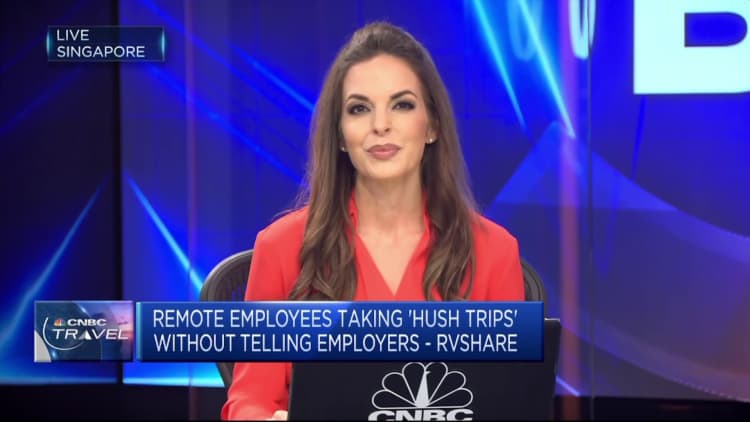
Many workers choose to remain secretive about their trips in order to avoid productivity concerns and questions about taxes from their employers.
However, others have shared with CNBC Travel that they keep their trips a secret for different reasons, and have requested that their full names not be published to prevent identification by their employers.
Avoiding the Hassle of Company Approval
A Singaporean named Alicia confessed to taking several trips without informing her employer.
“It’s easy for me since I don’t have to go to the office, and my manager isn’t even based in the same region,” she said.
Her tech company in Singapore has a 30-day remote working policy, but she prefers not to go through the hassle of applying and waiting for approvals that can take weeks.
During her longest covert trip to Thailand, she shared her experience with CNBC Travel. For other trips, she extended her time away without notifying her employer to avoid using up her PTO days.
Workcations vs. Hush Trips
- 45% of employees have taken a workcation in the past year
- 8% did not inform their companies
- Top reasons: visiting family and friends (51%); seeking a change of scenery (48%); staying productive at work (44%)
All of Alicia’s trips have been in Asia so far, allowing her to stay in similar time zones for attending meetings. To hide her location, she blurs her video call backgrounds or uses virtual backgrounds, and avoids unnecessary small talk to prevent unwanted questions.
“I don’t like outright lying, and that won’t be necessary if the questions don’t arise,” she explained.
Prior to traveling, Alicia gradually reduced her office visits and after-work gatherings with colleagues, making it easier for her to slip away for short periods of time.
But not everyone has been as fortunate.
“I know people who have done hush trips, and their managers schedule in-person meetings with clients the day before,” she stated. “They would have to book a ticket back immediately.”
Alicia revealed that she is not worried about being discovered by her employer because she recently resigned from her position.
“I’m currently serving my notice period this month,” she said. “If I get caught, it won’t really matter to me.”
She emphasized that neither her travels nor her resignation have affected her work ethic.
“At the end of the day, I’m still delivering on my job,” she affirmed.
Concerns About Coworkers
A resident of Maryland named Ellie disclosed that she has taken two hush trips to Virginia’s Shenandoah Valley in the past year.
“Although my employer wouldn’t mind, I don’t want my coworkers in the office to be envious or think that I’m not working as hard,” she explained.
For her job in digital marketing, she works in the office two to three days a week. When she goes on trips, she leaves after work on Wednesdays and works remotely for the rest of the week.
If I can be in nature before and after my work hours, I am always happier.
Similar to Alicia, Ellie relies on background filters for Zoom calls and suggests checking Wi-Fi and mobile phone service before booking a trip. So far, the only issues she has encountered on her trips relate to internet connectivity.
“I am an avid camper and love the outdoors,” she shared. “As long as there is Wi-Fi, I am always happier if I can spend time in nature before and after work hours!”
Companies in the Dark
Amy Zimmerman, the Chief People Officer at the digital payments company Relay Payments, expressed her view that it is not ideal for companies to be unaware of their employees’ locations.
“It’s important to create an environment where team members are honest about their travel and it doesn’t turn into a ‘hush trip,'” she stated.
At the same time, Zimmerman advised employees who are given flexibility to take workcations to follow common-sense guidelines while away.
“For example, it’s not appropriate to attend a Zoom meeting from the pool while in a bathing suit,” she pointed out. “If you are missing important meetings or requiring others to pick up your workload, it’s best to take PTO rather than trying to work during your travel.”
An anonymous account executive at a public relations agency in Singapore informed CNBC Travel about occasionally traveling without informing superiors at their previous job, as they rarely had in-person meetings and mostly worked from home. They turned off their webcam during meetings and avoided discussing the weather to hide their location.
However, at their current job, they no longer need to engage in such tactics as their employer has a flexible work policy that allows for travel while on the clock.
“Thankfully, with my current company, we are very open to working from overseas,” they said. “Several of my colleagues have homes in Malaysia and travel between Singapore and Malaysia on a weekly basis.”
Denial of responsibility! VigourTimes is an automatic aggregator of Global media. In each content, the hyperlink to the primary source is specified. All trademarks belong to their rightful owners, and all materials to their authors. For any complaint, please reach us at – [email protected]. We will take necessary action within 24 hours.


